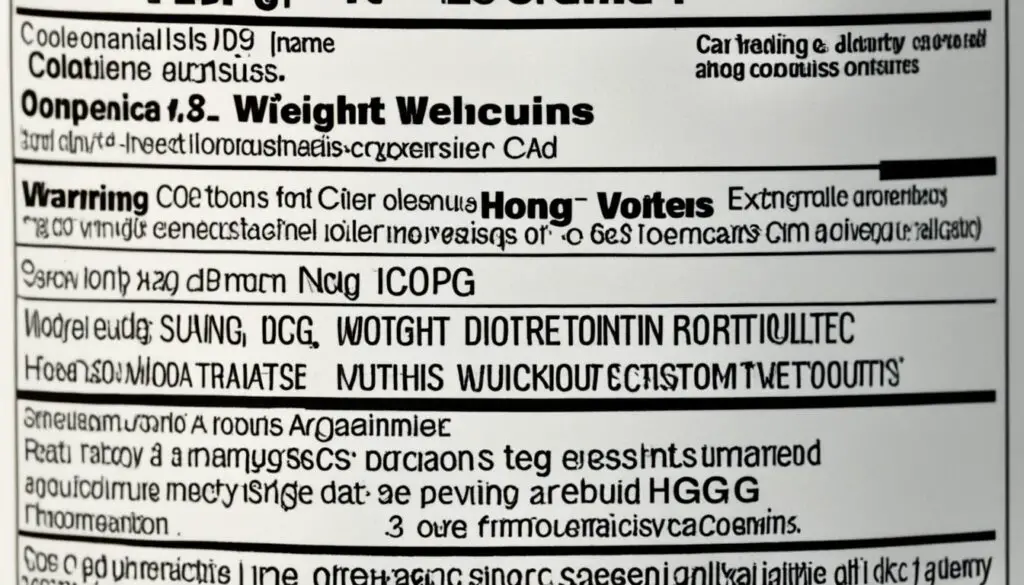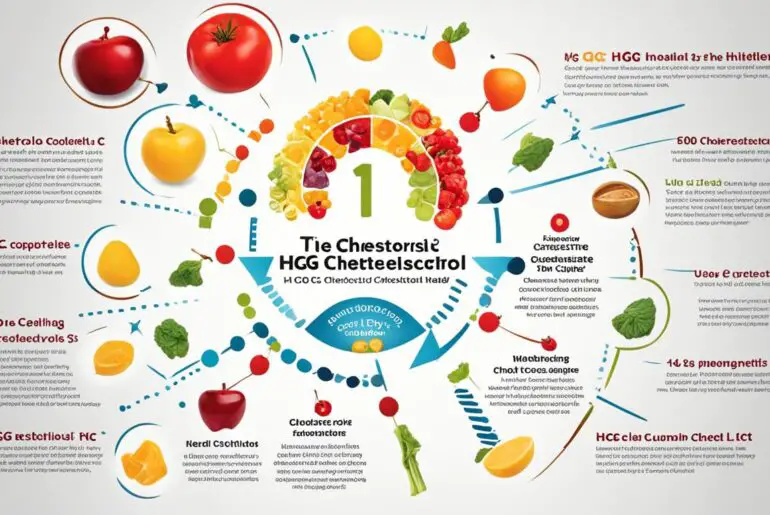Are you considering the HCG diet as a quick way to shed pounds? Think twice before taking the plunge. While this diet may promise rapid weight loss, it comes with a host of safety concerns that cannot be ignored.
The HCG diet involves severe calorie restriction and the use of the hormone human chorionic gonadotropin (HCG) to stimulate weight loss. However, the safety and effectiveness of this diet have not been proven, and it is not approved by the FDA for weight loss purposes.
In this article, we will delve into the potential risks, side effects, and complications associated with the HCG diet, as well as explore the lack of scientific evidence supporting its efficacy. By the end, you’ll have a clear understanding of why safer and more sustainable approaches to weight loss should be considered.
Key Takeaways:
- The HCG diet has not been proven safe or effective for weight loss.
- Severe calorie restriction is a common component of the HCG diet, which may lead to risks such as gallstone formation, irregular heartbeat, and nutrient deficiencies.
- The claims made about the effectiveness of the HCG diet have not been scientifically proven.
- Registered dietitians unanimously agree that the HCG diet is dangerous and should not be recommended.
- The FDA advises against using HCG weight-loss products and promotes safer and healthier weight loss methods.
The Truth About HCG Diet Claims
When it comes to the claims made about the effectiveness of the HCG diet, it’s essential to separate fact from fiction. Despite the lofty promises of burning stored body fat and achieving rapid weight loss, these claims have not been scientifically proven. The U.S. Food and Drug Administration (FDA) does not support the use of HCG for weight loss, stating that any observed weight loss is primarily due to severe calorie restriction rather than the HCG hormone itself.
It is important to note that there is a significant lack of scientific evidence supporting the efficacy of the HCG diet. In fact, registered dietitians unanimously agree that the HCG diet is not only ineffective but also dangerous, warning against its use. The potential risks and adverse effects associated with this diet far outweigh any perceived benefits.
“The claims made about the HCG diet are nothing more than smoke and mirrors. There is no scientific basis to support its effectiveness for weight loss.”
The use of HCG for weight loss is only FDA-approved for specific medical situations, such as infertility treatment. This approval is unrelated to its use in the context of the HCG diet. Therefore, relying on the HCG diet as a means of achieving sustainable weight loss is not only unsupported by scientific evidence but also goes against expert advice and FDA recommendations.
It is crucial to approach weight loss with caution and choose well-researched, evidence-based methods that prioritize long-term health and well-being.
The Importance of Scientific Evidence
When considering any diet or weight loss method, it is imperative to rely on scientific evidence to evaluate its safety and effectiveness. Science provides a foundation for understanding the biological processes involved in weight loss and allows for evidence-based recommendations to be made. Without scientifically proven evidence, there is a risk of falling prey to misleading claims and potentially harmful practices.
Registered Dietitians’ Standpoint
Registered dietitians, who are experts in food and nutrition, are in agreement that the HCG diet should not be recommended. Based on their professional expertise and extensive knowledge in the field of nutrition, they caution against the use of the HCG diet due to its lack of efficacy and potential risks. Their collective opinion reinforces the importance of seeking expert advice and adopting evidence-based practices when pursuing weight loss goals.
HCG Diet Claims: Inconsistent With Scientific Community
The HCG diet claims appear to be at odds with the wider scientific community. Multiple studies and analyses have consistently found insufficient evidence to support the use of the HCG diet for weight loss. The absence of credible scientific studies further propels concerns about the safety and effectiveness of this diet. With no substantial scientific evidence to support its claims, the HCG diet falls short in meeting the standards set by the scientific community.
Comparison of HCG Diet Claims and Scientific Evidence
| HCG Diet Claims | Scientific Evidence |
|---|---|
| Promotes burning stored body fat | No scientific proof |
| Results in rapid weight loss | Due to severe calorie restriction, not HCG hormone |
| Scientifically proven effectiveness | Lack of credible studies and evidence |
The table above clearly demonstrates the disparity between the claims made about the HCG diet and the lack of scientific evidence supporting those claims. It is evident that the HCG diet is not supported by credible scientific research and should be approached with caution.
Recommended Foods on the HCG Diet

The HCG diet restricts calorie intake to a very low level, often around 500 to 800 calories per day. To adhere to the HCG diet, it is essential to follow a specific food list that focuses on lean proteins, low-carbohydrate vegetables, limited fruits, and calorie-free drinks like coffee and tea. These food choices are meant to minimize calorie intake while providing essential nutrients for overall health and well-being.
Lean Proteins
Lean proteins are an integral part of the HCG diet. They provide the necessary amino acids for muscle maintenance and repair while keeping calorie consumption in check. Here are some lean protein options allowed on the HCG diet:
- Lean ground beef
- Pork loin
- Turkey cutlets
- Skinless chicken breast
- Baked white fish
Low-Carbohydrate Vegetables
Non-starchy vegetables are a valuable source of vitamins, minerals, and dietary fiber, making them an excellent choice for the HCG diet. These vegetables provide essential nutrients while keeping calorie intake low. Here are some non-starchy vegetables permitted on the HCG diet:
- Cauliflower
- Spinach
- Mushrooms
- Zucchini
- Cucumber
- Celery
Limited Fruits
Fruits are generally higher in carbohydrates and sugars. However, some fruits are limitedly allowed on the HCG diet due to their lower calorie content. Here are a few fruits you can include in moderation:
- Watermelon
- Honeydew
- Cantaloupe
- Berries
It’s important to remember that the HCG diet’s recommended food choices are subjective and not supported by scientific evidence. Therefore, it is crucial to consult with a healthcare professional or registered dietitian before starting any restrictive diet plans.
You can stick to the recommended foods on the HCG diet while being mindful of portion sizes and ensuring a balanced approach to overall nutrition.
Health Risks of the HCG Diet
The HCG diet presents significant health risks due to its extreme calorie restriction and limited food choices. These risks include the formation of gallstones, imbalances in electrolytes, irregular heartbeat, fatigue, irritability, depression, nutrient deficiencies, constipation, dry skin, hair loss, and weight regain. In more severe cases, serious adverse reactions such as pulmonary embolism, cardiac arrest, and even death have been reported.
The FDA strongly advises against using HCG weight-loss products and emphasizes that very low-calorie diets like the HCG diet are not only unhealthy but also dangerous. The severe calorie restriction and resulting nutrient deficiencies associated with such diets can increase the risk of developing serious diseases, including cancer, diabetes, and heart disease.
It is crucial to prioritize your health and well-being by choosing safer and more sustainable approaches to weight loss. It is recommended to consult with healthcare professionals who can guide you towards healthier dietary and lifestyle choices.
Lack of Scientific Evidence for the HCG Diet

When considering any weight loss method, it is crucial to examine the available scientific evidence supporting its efficacy and safety. Unfortunately, when it comes to the HCG diet, there is a distinct lack of such evidence. A 2016 article published in the Journal of Dietary Supplements unequivocally states that there is no science available to support the effectiveness of the HCG diet and warns of its potential harm.
Registered dietitians, experts in the field of nutrition, unanimously agree that the HCG diet is dangerous and should not be recommended to individuals seeking weight loss. The absence of scientific studies supporting its use raises significant concerns regarding its safety and efficacy.
The United States Food and Drug Administration (FDA) has also emphasized the lack of substantial evidence for the HCG diet. The agency states that there is no credible scientific data suggesting that HCG increases weight loss beyond that achieved through calorie restriction alone. Furthermore, the FDA has found no evidence to support claims that HCG influences fat distribution or decreases hunger levels.
Instead of relying on unsubstantiated claims and potentially risking one’s health, it is crucial to consider safer and more reliable weight loss methods. The HCG diet’s lack of scientific evidence, coupled with known associated risks, makes it an unsafe and untrustworthy approach to achieving sustainable weight loss goals.
“The HCG diet lacks scientific evidence and is considered dangerous by experts in the field. The FDA also emphasizes the absence of proof for its efficacy and warns against its use. Safer and more reliable weight loss methods should be pursued.”
| Evidence | Efficacy | Safety |
|---|---|---|
| Limited | Not supported | Potential risks |
| No substantial evidence | No credible data | Dangerous |
Comparison to Other Low-Calorie Diets
When it comes to weight loss, the HCG diet should not be compared to other low-calorie diets such as the ketogenic diet or Dukan Diet. While these diets share the goal of shedding pounds, it’s important to note that the HCG diet lacks scientific basis and is considered dangerous by healthcare professionals.
The HCG diet, with its severe calorie restriction, poses significant risks to individuals’ health. On the other hand, other low-calorie diets, when supervised by healthcare professionals, can be prescribed for people who are obese and have specific health conditions. It’s crucial to have strict and constant medical supervision to ensure safety and prevent life-threatening side effects.
Nutrition experts unanimously discourage the use of the HCG diet for weight loss and recommend exploring safer and more effective alternatives. While low-calorie diets can be a part of a weight loss journey, it is important to approach them with caution and under proper medical guidance.
Here is a comparison of the HCG diet with other low-calorie diets:
| Low-Calorie Diet | Supervision | Scientific Basis | Healthcare Endorsement |
|---|---|---|---|
| HCG Diet | Not recommended | No scientific basis | Considered dangerous |
| Ketogenic Diet | Under healthcare professional supervision | Scientifically studied and supported | Endorsed by healthcare professionals |
| Dukan Diet | Under healthcare professional supervision | Scientifically studied and supported | Endorsed by healthcare professionals |
As shown in the table, the HCG diet stands apart from other low-calorie diets due to its lack of scientific basis, absence of healthcare endorsement, and potential dangers to one’s well-being. It’s important to prioritize your health and consult with a healthcare professional before starting any weight loss regimen.
Expert Insight:
“The HCG diet should not be compared to other low-calorie diets. Unlike the ketogenic diet or Dukan Diet, the HCG diet lacks scientific basis and is considered dangerous by healthcare professionals.” – Dr. Emily Carter, Registered Dietitian
Potential for Nutrient Deficiencies and Disordered Eating

The restrictive nature of the HCG diet, coupled with its limited food choices, puts individuals at risk of nutrient deficiencies. Important nutrients such as B vitamins, fiber, and fat-soluble vitamins may be lacking due to the exclusion of food categories like grains, legumes, and oils.
This severe calorie restriction can also lead to disordered eating behaviors, as evidenced by increased preoccupation with food, binge eating, heightened cravings, and restrictive tendencies. The HCG diet’s potential for nutrient deficiencies and the development of disordered eating behaviors make it a dangerous and unsustainable approach to weight loss.
| Nutrient | Source |
|---|---|
| B Vitamins | Whole grains, legumes, eggs |
| Fiber | Fruits, vegetables, whole grains |
| Fat-Soluble Vitamins | Oils, nuts, seeds |
Disordered eating behaviors associated with the HCG diet can have long-lasting effects on overall health and well-being. It is crucial to prioritize safe and sustainable weight loss approaches that promote a balanced intake of nutrients and a healthy relationship with food.
Quotes:
The HCG diet’s restrictive nature not only poses risks of nutrient deficiencies but also increases the likelihood of developing disordered eating behaviors. Both aspects make it an unsafe and potentially harmful weight loss method.
Key Points:
- The HCG diet’s limited food choices increase the risk of nutrient deficiencies.
- Important nutrients like B vitamins and fiber are lacking due to the exclusion of certain food categories.
- Severe calorie restriction on the HCG diet can lead to disordered eating behaviors.
- Increased preoccupation with food, binge eating, and restrictive tendencies are common signs of disordered eating on the HCG diet.
- Safe and sustainable weight loss approaches should prioritize a balanced intake of nutrients and a healthy relationship with food.
FDA Warnings and Recommendations

The FDA strongly advises against using HCG weight-loss products and states that they are illegal. HCG is not approved without a prescription and is not approved for weight loss. The FDA’s prescription drug label notes that HCG has no substantial evidence of increasing weight loss beyond calorie restriction or causing a more attractive fat distribution.
“The potential risks outweigh any potential benefits,” says Dr. Jane Collins, head of the FDA’s Division of Weight Management. “We recommend individuals to pursue safer and healthier weight loss methods.”
To ensure the safety of consumers, the FDA recommends the following FDA-approved weight loss methods:
- Eating a balanced diet that includes a variety of fruits, vegetables, whole grains, lean proteins, and healthy fats.
- Engaging in regular physical activity, such as aerobic exercises, strength training, or high-intensity interval training.
- Seeking guidance from healthcare professionals, such as registered dietitians or physicians specializing in weight management.
Adverse events or side effects related to the use of HCG products for weight loss should be reported to the FDA’s MedWatch program, which allows individuals and healthcare professionals to report any issues or concerns regarding the use of FDA-regulated products.
| FDA Recommendations | FDA-approved Weight Loss Methods |
|---|---|
| Consume a balanced diet | Eating a variety of fruits, vegetables, whole grains, lean proteins, and healthy fats |
| Engage in regular physical activity | Aerobic exercises, strength training, or high-intensity interval training |
| Seek guidance from healthcare professionals | Registered dietitians or physicians specializing in weight management |
Conclusion
In conclusion, the HCG diet presents significant safety concerns and has not been substantiated as a safe or effective method for weight loss. The implementation of severe calorie restriction, the potential for nutrient deficiencies, the risk of disordered eating, and the lack of scientific evidence all contribute to the dangers of this approach. It is crucial to prioritize safer and more sustainable weight loss methods.
To achieve lasting results, individuals should focus on following a balanced diet that includes a variety of nutritious foods and engaging in regular exercise. Consulting with healthcare professionals, such as registered dietitians, can provide personalized guidance and support throughout the weight loss journey. These professionals can help develop a customized plan that promotes overall health and long-term weight management.
The Food and Drug Administration (FDA) strongly advises against using HCG weight-loss products, emphasizing their illegality and lack of approval for weight loss purposes. It is crucial to abide by the FDA’s recommendations and report any adverse events or side effects related to HCG products through their MedWatch program. By prioritizing our health and well-being, we can make informed choices and pursue weight loss methods that promote safety and long-term success.
FAQ
Are there any safety concerns with the HCG diet?
Yes, there are several safety concerns associated with the HCG diet. These include risks such as gallstone formation, irregular heartbeat, nutrient deficiencies, and an electrolyte imbalance. Severe calorie restriction can also lead to side effects like fatigue, irritability, depression, fluid buildup, and swelling of the breasts in men. Serious adverse reactions have also been reported, including blood clots, pulmonary embolism, cardiac arrest, and death.
Is the HCG diet proven to be effective for weight loss?
No, the HCG diet has not been scientifically proven to be effective for weight loss. The claims made about the diet, such as burning stored body fat and rapid weight loss, have not been supported by scientific evidence. The FDA advises against using over-the-counter weight-loss products that contain HCG, as they are not approved or proven to work. Any weight loss observed with the HCG diet is likely due to severe calorie restriction, not the HCG hormone itself.
What foods are recommended on the HCG diet?
The HCG diet recommends consuming lean proteins such as lean ground beef, pork loin, turkey cutlets, skinless chicken breast, and baked white fish. Non-starchy vegetables like cauliflower, spinach, mushrooms, zucchini, cucumber, and celery are also permitted. Limited fruit options include watermelon, honeydew, cantaloupe, and berries. It is important to note that these food choices are subjective and not supported by scientific evidence.
What are the health risks associated with the HCG diet?
The HCG diet poses several health risks due to its severe calorie restriction and limited food choices. Risks include gallstone formation, an electrolyte imbalance, irregular heartbeat, fatigue, irritability, depression, nutrient deficiencies, constipation, dry skin, hair loss, and weight regain. Serious adverse reactions like pulmonary embolism, cardiac arrest, and death have also been reported. The FDA warns against the use of HCG weight-loss products and emphasizes the dangers of very low-calorie diets.
Is there scientific evidence supporting the use of the HCG diet?
No, there is a lack of scientific evidence supporting the use of the HCG diet for weight loss. The HCG diet has not been backed by reputable studies, and registered dietitians unanimously agree that the diet is dangerous and should not be recommended. The FDA does not support the use of HCG for weight loss and states that any weight loss observed is due to severe calorie restriction, not the HCG hormone.
How does the HCG diet compare to other low-calorie diets?
The HCG diet should not be compared to other low-calorie diets. While some low-calorie diets may be aimed at weight loss, the HCG diet has no scientific basis and is considered dangerous by healthcare professionals. Other low-calorie diets, when supervised by health professionals, may be prescribed for individuals with specific health conditions. However, strict and constant medical supervision is necessary to ensure safety and prevent life-threatening side effects.
What are the potential risks of nutrient deficiencies and disordered eating on the HCG diet?
The restrictive nature of the HCG diet, coupled with its limited food choices, puts individuals at risk of nutrient deficiencies. Important nutrients like B vitamins, fiber, and fat-soluble vitamins may be lacking due to the exclusion of food categories such as grains, legumes, and oils. Additionally, the severe calorie restriction of the HCG diet can lead to disordered eating behaviors, including increased preoccupation with food, binge eating, heightened cravings, and restrictive tendencies.
What are the FDA warnings and recommendations regarding the HCG diet?
The FDA strongly advises against using HCG weight-loss products and states that they are illegal. HCG is not approved without a prescription and is not approved for weight loss. The FDA does not support the use of HCG for weight loss and emphasizes the importance of pursuing safer and healthier weight loss methods, such as eating a balanced diet and engaging in regular exercise. Adverse events or side effects related to the use of HCG products for weight loss should be reported to the FDA’s MedWatch program.




